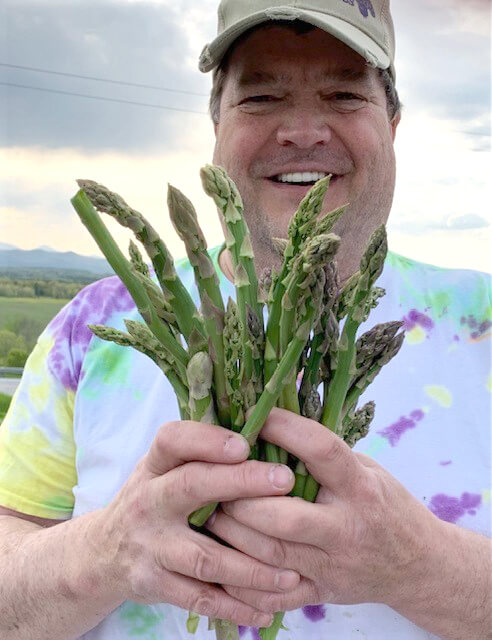May fair
After a nearly non-winter of moderately poor ice fishing, I’ve been reveling in the bright sunshiny days of early spring. The lilacs and honeysuckle permeate the air, smelling like the candy “Sweet Tarts” I knew growing up. After the bobolinks have had their chance to raise a brood in the fields, the first cut of hay smells so sweet. The lake begins to render up its fresh fragrance, and all the world seems to be waking up to stretch our limbs. Buds pop on the maples, and willows begin weeping quiet tears of joy in the morning light. We have been through such a dark period that this spring feels like it’s possible that everything will be all right.

We’ve collected the fiddleheads and sauteed them in butter and garlic, pickled them with mustard seeds, and canned ramps with honey ginger and balsamic vinegar. We’ve had screaming matches with the big gobblers on the ridge at sunrise, but still have not talked one all the way in. There is so much abundance in May. Rainbow trout are beginning to feed heavily in the big rivers, and one of my favorite wild edibles to forage is beginning to pop up every 48 hours, the much beloved wild asparagus.
It is kind of funny when someone asks me, “Where did you find those?” I look at them quizzically, like they had just asked me for directions to King Solomon’s temple, where he had hidden his treasures. I love to share my treasures with others—after they’ve been picked. But for God’s sake, man! Don’t ask me where they are!
The wild asparagus plots are a fraternal secret known only to those who seek the wisdom of sages like Euell Gibbons. It’s not much different than asking a hunter where his best coverts for timberdoodle or partridge are located. Or the honey hole in the mountain streams where one can catch a dozen colorful brook trout. These morsels of outdoor wisdom are given only to those who earn them.
I have been criticized for writing about foraging, hunting and fishing because it makes it more popular and causes the hard-won prizes to be distributed in a manner that is sometimes not advantageous to the master forager. If you don’t believe it, try asking someone: “Where, exactly, did you find those morels?” You will get that same face that screws up one eye and pinches one side of the lips upward, to indicate that that must be one of the most ridiculous questions ever asked.
Don’t get me wrong. I do like to share, and I like to teach others how to hunt, fish and forage. But the emphasis is on the “how” not the “where.” I believe that the effort taken to learn about the plant, where it resides, what conditions it favors, when it tends to appear, and under what type of tree, will lead to further learning and discovery about out natural world. With this will come respect and thoughtfulness for the actual being, be it plant, animal or mineral. All have a divine purpose, and by seeking the wisdom to find that for which we seek, we learn to cherish the world we live in every day.
It’s so easy to go about our lives, focused on accomplishing some tasks, achieving some status, or just putting more money in our bank accounts. And there is value in learning to take care of oneself in this manner. But those ventures frequently take us away from our connection to Mother Earth, on which we tread every day.
Focusing on the ethereal and enlightened world of natural life around us brings mindfulness and serenity. So, dear reader, as you ponder my pedantic musings, take time to consider stepping outside and learning about the benefits of sauteing tender nettle shoots or steaming dandelion greens. Get down on your hands and knees in the woods and use the vision of the field mouse. Look closely and you may find an entire world that can sustain and nurture you in a way that fills your heart and your belly with joy. And when someone asks you “Where did you get those beautiful maitake mushrooms?” you can look at them, twist your face into a contorted caricature and reply, “I was crawling on the ground in the woods.”
Bradley Carleton is Executive Director of Sacred Hunter, a nonprofit that seeks to educate the public on the spiritual connection of man to nature.

